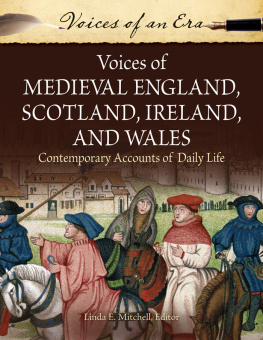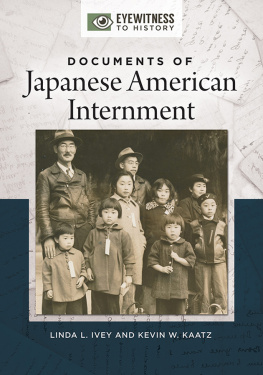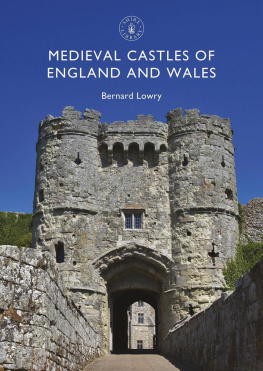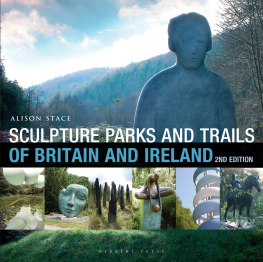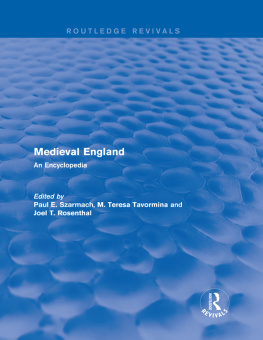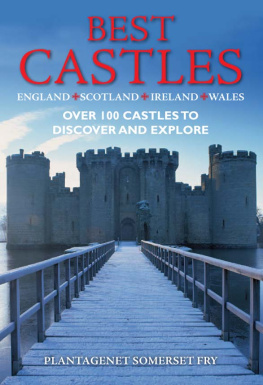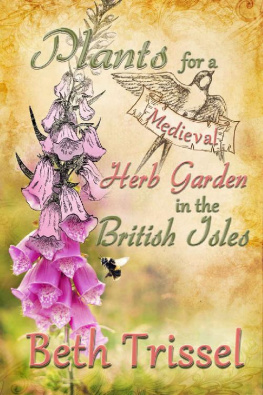Recent Titles in Voices of an Era
Voices of Civil War America: Contemporary Accounts of Daily Life
Lawrence A. Kreiser, Jr. and Ray B. Browne, editors
Voices of Early Christianity: Documents from the Origins of Christianity
Kevin W. Kaatz, editor
Voices of Early Modern Japan: Contemporary Accounts of Daily Life during the Age of the Shoguns
Constantine Vaporis, editor
Voices of Revolutionary America: Contemporary Accounts of Daily Life
Carol Sue Humphrey, editor
Voices of Shakespeares England: Contemporary Accounts of Elizabethan Daily Life
John A. Wagner, editor
Voices of Victorian England: Contemporary Accounts of Daily Life
John A. Wagner, editor
Voices of World War II: Contemporary Accounts of Daily Life
Priscilla Mary Roberts, editor
Voices of Ancient Egypt: Contemporary Accounts of Daily Life
Rosalie David, editor
Voices of the Reformation: Contemporary Accounts of Daily Life
John A. Wagner, editor
Voices of the Iraq War: Contemporary Accounts of Daily Life
Brian L. Steed, editor
Voices of Medieval England,
Scotland, Ireland, and Wales
Contemporary Accounts
of Daily Life
Linda E. Mitchell

Copyright 2016 by ABC-CLIO, LLC
All rights reserved. No part of this publication may be reproduced, stored in a retrieval system, or transmitted, in any form or by any means, electronic, mechanical, photocopying, recording, or otherwise, except for the inclusion of brief quotations in a review, without prior permission in writing from the publisher.
Library of Congress Cataloging-in-Publication Data
Names: Mitchell, Linda Elizabeth, editor.
Title: Voices of medieval England, Scotland, Ireland, and Wales : contemporary accounts of daily life / Linda E. Mitchell, editor.
Description: Santa Barbara, California : Greenwood, an Imprint of ABC-CLIO, LLC, [2016] | Series: Voices of an Era | Includes bibliographical references and index.
Identifiers: LCCN 2016011259 (print) | LCCN 2016016430 (ebook) | ISBN 9781610697873 (hardcopy : alk. paper) | ISBN 9781610697880 (ebook)
Subjects: LCSH: Great BritainSocial life and customs10661485Sources. | Great BritainSocial life and customsTo 1066Sources. | EnglandSocial life and customsSources. | ScotlandSocial life and customsSources. | IrelandSocial life and customsSources. | WalesSocial life and customsSources.
Classification: LCC DA170 .V65 2016 (print) | LCC DA170 (ebook) | DDC 941.03dc23 LC record available at https://lccn.loc.gov/2016011259
ISBN: 9781610697873
EISBN: 9781610697880
20 19 18 17 161 2 3 4 5
This book is also available as an eBook.
Greenwood
An Imprint of ABC-CLIO, LLC
ABC-CLIO, LLC
130 Cremona Drive, P.O. Box 1911
Santa Barbara, California 93116-1911
www.abc-clio.com
This book is printed on acid-free paper 
Manufactured in the United States of America
CONTENTS
PREFACE
Voices of Medieval England, Ireland, Scotland, and Wales contains excerpts from some 63 unique sources, arranged into 8 topical sections and 50 subsections. The sources range in date from the 600s to the late 1400s and cover the multiple and diverse cultures of England both before and after the Norman Conquest (1066); early and later medieval Ireland and the Lordship of Ireland that resulted from the English conquest of the twelfth century; the Scotland of the early medieval Scots and Picts as well as the unified kingdom of Scots that developed after the year 1000; and the region of Wales from the early native principalities to the English conquest of the thirteenth century and the establishment of the English Principality. This is a very long time frame, and a widely diverse collection of peoples and cultures; as a result, not all cultures are treated equally or consistently, but the reader will find all cultures represented on some level in every section.
The history of the British Isles in the Middle Agesa period that covers a thousand years (from 500 to 1500) and includes many different cultures, from Celtic peoples, to the Anglo-Saxons, Vikings from Scandinavia, Normans (who had been Vikings) and Frenchis significant for a number of reasons, both for the people of the time and those of later eras who now live in English-speaking countries all over the globe because of Britains imperial conquests of the seventeenth and eighteenth centuries. First, Britain and Ireland and the small islands that surround their coasts had a long history of interaction with each other and also the European continent. Indeed, all the people living in the British Isles throughout the Middle Ages were immigrants, from the Celtic groups that arrived before recorded history, to the Germanic groups that traversed the English Channel and the North Sea between the sixth and eleventh centuries, and occupied territories throughout the islands. This diversity and the retention of continental ties affected the development of the islands cultures. Irish missionaries converted Anglo-Saxon kings in the sixth century, and continental Europeans in the eighth and ninth centuries; Norse kings occupied the northern isles of Scotland until the fourteenth century; Anglo-Saxon kings married Merovingian and Carolingian princesses; Normansdescended from Vikings who occupied the region around the mouth of the Seine Rivercovered the British Isles, establishing lordships and building castles in Britain, Wales, and Ireland; they married local women, creating hybrid medieval cultures that have endured into the modern age. Second, the peoples of the British Isles during and after the medieval period also carried their cultures all over the world, through crusade, settlement, and conquest. The seeds of the British Empire lie in the planting of Anglo-Norman people and governance in Ireland and Wales; the kings of Scotland in the twelfth century embraced Norman culture as well, inviting Norman barons to become a new magnate class north of the border and building their royal administration on the framework of Anglo-Norman systems. Thus, any country all over the world touched by British imperialism has a connection to Britain and Ireland in the medieval period.
PRIMARY SOURCES, MEDIEVAL CULTURE, AND THE MODERN RESEARCHER
Primary sourcesmaterials that were created at the time under studyare an essential component to historical research and form the foundation of what historians of every era and geographical region use as the basis for research and the writing of historical texts. For the Middle Ages, primary sources are complicated, because historians have to choose between the kinds of sources all historians would consider primarythe public and private documents created by individuals or institutions that record their daily lives, practices, thoughts, and ideasand those that some historians might consider secondaryworks of interpretive history written by people of the era but not quite contemporary with the events being discussed. Recognizing that both components comprise the essential materials needed to understand the medieval world, this sourcebook incorporates both kinds of written medieval sources. In addition, I recognize that medieval sources can also be unwritten: they can comprise the material remains of cultures of the medieval world, such as archaeological remains, buildings, art and artifacts, and the physical material of the documents themselves: the animal skins, ink, glue, and thread that were used to create books; and many other forms of written texts. Sources can also be, in some way, immaterial, such as music that has been reconstructed from arcane notation in manuscripts, performed on instruments built not at the time, but through interpretations of images of musical instruments depicted in books and on the facades of churches. All these comprise potential sources for study of the Middle Ages.

